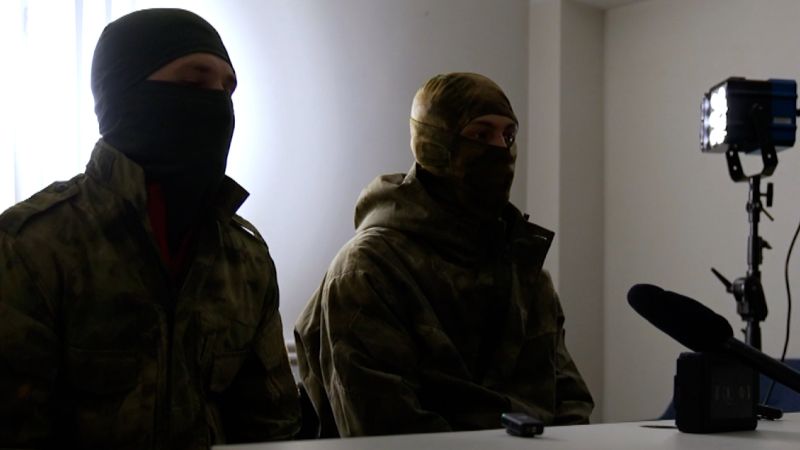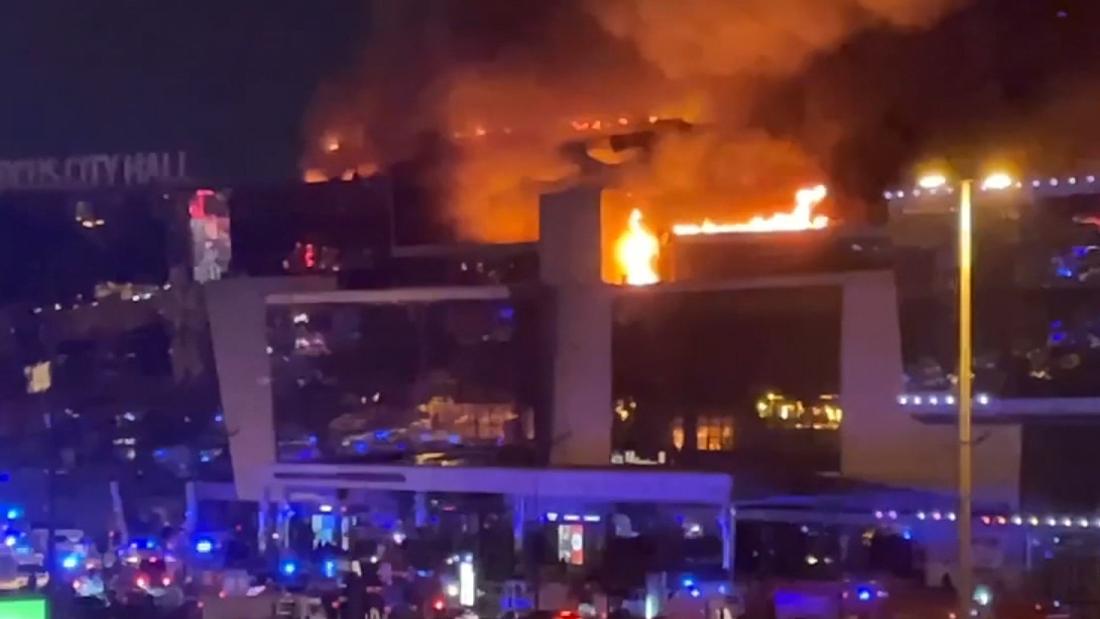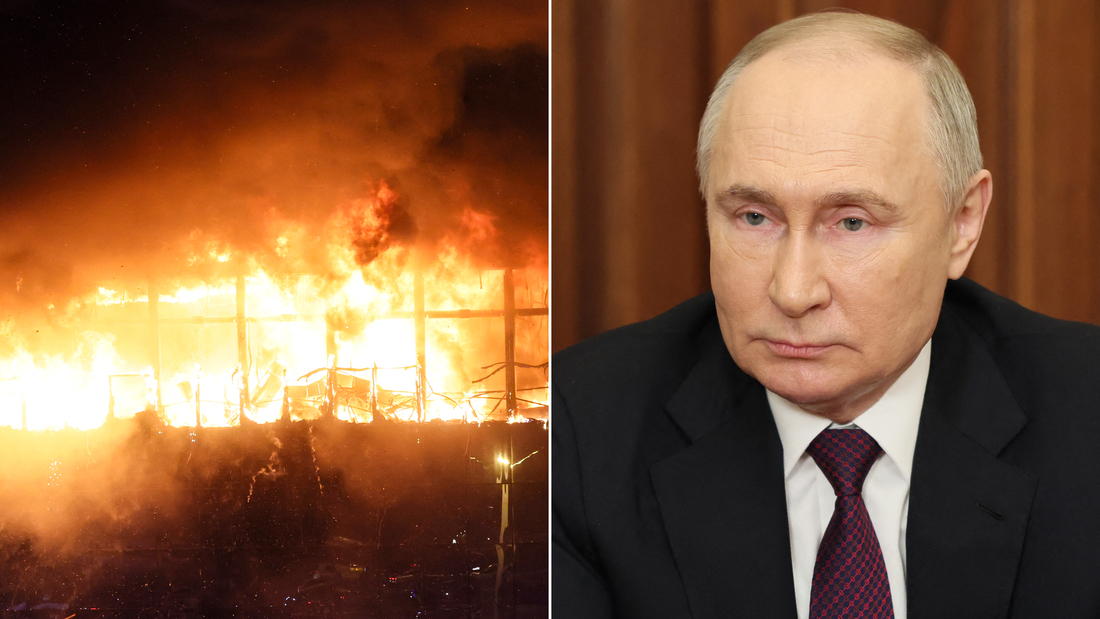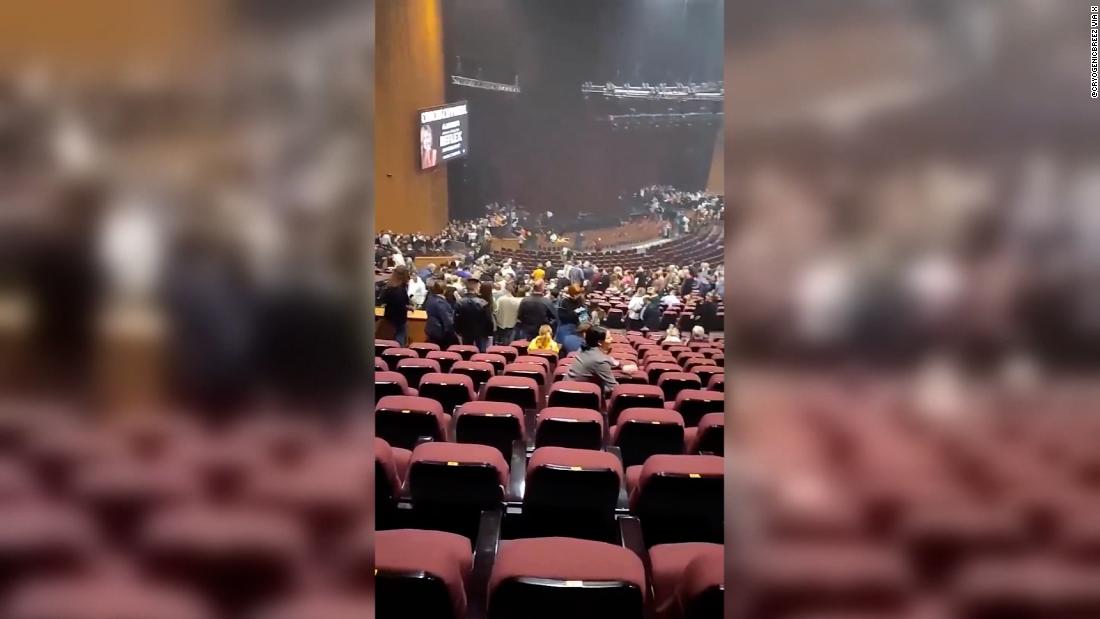Kyiv, Ukraine
CNN
—
Two former fighters of the Russian private military company Wagner have told CNN of their horrific experiences on the battlefield in eastern Ukraine, and how anyone who faltered was immediately shot by their own commanders.
The two fighters were captured by Ukrainian forces late last year. CNN is not disclosing their identities for their own safety. Both are married with children and were recruited while in prison. One was serving a 20-year sentence for manslaughter.
For security reasons, the Ukrainians kept a presence in the room where the interview took place. CNN told the fighters that they could end the interview at any time they wished. But they spoke in detail for more than an hour.
The two fighters told of hideous losses in “first wave” assaults reminiscent of World War I charges.
“There were 90 of us. Sixty died in that first assault, killed by mortar fire. A handful remained wounded,” said one, recalling his first assault near the village of Bilohorivka. “If one group is unsuccessful, another is sent right away. If the second one is unsuccessful, they send another group.”
The other fighter was involved in an assault lasting five days, through a forest near the city of Lysychansk on the Luhansk-Donetsk border in eastern Ukraine.
“The first steps into the forest were difficult because of all the landmines spread out. Out of 10 guys, seven were killed immediately,” he said.
“You can’t help the wounded. The Ukrainians were firing heavily on us, so even if their wounds were minor, you’ve got to keep going, otherwise you’re the one getting hit by the fire.
“You are at it for five days, people dying right next to me, praying to God, begging for water. You think that you can put down your weapon and nothing else will happen. And then the fight starts again 10 minutes later, and [the Ukrainians] keep coming after you. There is no feeling attached to it. Just wave after wave.”
“Four hundred [Wagner fighters] were brought there, and then more and more, all the time.”
The prisoner said a self-preservation instinct had kicked in for him, but others froze. “Some stop right there in the forest and drop their weapons. But to drop your weapons is to come under sniper fire and die.”
There was no evacuation of the wounded, he added. “If you’re wounded, you roll away on your own at first, any way you can, somewhere neutral where there’s no fire, and if there’s no one around, you administer first aid to yourself,” he said.
Casualties piled up by the dozen, the men said. “When the casualties arrive, you get orders to load them, and you don’t really think who’s dead and who’s wounded,” one of the fighters said.
Throughout their several weeks on the front lines, the two men said they had only one instinct.
“Just to survive. I just had the desire to survive, no matter what the cost,” said the prisoner involved in the forest attack.
They became numb to the casualties and the killing of the Ukrainian soldiers they faced. “You’d think you’d feel something [after killing someone], but no, you just keep going.”
The alternative to walking through minefields towards Ukrainian artillery was just as lethal, according to the men’s accounts.
“We couldn’t retreat without orders because if we don’t comply with the order, we will be killed,” said one of the prisoners.
“One man stayed at a position, he was really scared, it was his first assault. We received an order to run forward. But the man hid under a tree and refused. This was reported to the command and that was it. He was taken 50 meters away from the base. He was digging his own grave and then was shot.”
The other fighter reported a similar situation: “Our commander was told that if anyone gets cold feet, he would have to be eliminated. And if we failed to eliminate him, we would be eliminated for failing to eliminate him.”
The two men described how they were recruited by Wagner. In August and September last year, the group’s chief, Yevgeny Prigozhin, arrived by helicopter at the prisons where they were held, offering six-month contracts in return for being pardoned.
One of the men still had 10 years of jail time ahead after a manslaughter conviction.
“I weighed that six months was better than the 10 or 11 years I could still spend in prison… I just wanted a fresh start in life,” he said.
At the time, Prigozhin’s recruitment campaign in Russia’s prisons was in full swing. It’s estimated by Western intelligence officials and prison advocacy groups that between 40,000 and 50,000 men were recruited.
On Thursday, Prigozhin said the prison recruitment drive was over but gave no reason.
“Only a handful in my unit came for money, most came because they had long sentences,” said one of the fighters. “But there were also some who had only 12 days of their sentence remaining, and they went anyway.
“They lined everyone up in the yard and Prigozhin started recruiting people,” he said. “[Prigozhin] said he had the authority from higher-up bodies to take anyone from the prison, regardless of the crimes or the prison term. The ideal candidates are murderers, robbers.”
The selection process was so rudimentary that older prisoners only had to show they could march a few yards, one of the prisoners said. “They took almost everyone.”
“Some of them were head cases … the crazy ones, the ones who when they get a weapon in their hands they wouldn’t know how to handle it,” he added.
For prison inmates with years to serve, the offer was tempting.
One of the prisoners said: “For our freedom we had to fight for six months in Ukraine, to fight the Nazis. At the same time, he promised us wages, repayment of loans, and a clean history.”
Russian President Vladimir Putin has repeatedly pushed the groundless rhetoric of “denazification” as justification for his invasion of Ukraine.
Soon after Prigozhin’s visits, hundreds of prisoners were taken by bus and plane to a training ground in the Rostov region of Russia, according to the two men.
There was a strict ban on drugs and alcohol, one of the prisoners said. Some of the commanders said they had fought for Wagner in Africa and Syria.
The training was brief and basic – handling guns for the terrible assaults they would soon be ordered to carry out. The men said it was clear they were being prepared for missions they’d not signed up for.
Now they are bitter about the deceptions in Prigozhin’s sales pitch.
“He did not mention anything about danger,” one said. “He talked about expunging all convictions, we would serve six months, all convictions would be expunged, an advance payment of 240,000 roubles (around $3,300) and also that our task was to hold the defense on the second line.”
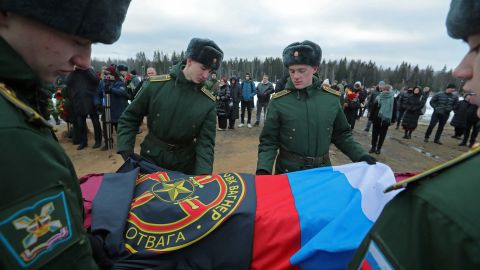
The two men also feel deceived about the nature of the conflict.
“We thought we’d be fighting Poles and various mercenaries. Germans. We didn’t think anyone was left in the Ukrainian army there. We thought they’d left the country,” said one.
“So it became clear they were just spinning lies to get us to enter into battle with the Ukrainians. No one really thought that the AFU [Armed Forces of Ukraine] would actually fight for their own country, for their loved ones. We only learned this after going in there.”
It was almost a relief to be captured, the prisoners said.
One said he and a wounded comrade were the only survivors in his group, caught “between two Ukrainian mortars and a sniper.”
“The command ordered me to dig in at my position, so I dug in at my position, awaiting evacuation. They sent one group of 10, and the sniper eliminated all 10,” he recalled.
“Then the command told us on the walkie-talkie: Get out any way you can, you’re on your own.”
It was then, he said, that Ukrainian soldiers “came up and fired a shot next to my foot, said ‘hands up,’ and that was it.”
When asked if they would make the same decision again, the prisoners paused for a moment.
“I think it was the wrong choice… I’d never participated in any military operation, especially fighting against the AFU, which refuses to give up its land. They brought us here under the wrong pretext. And so we are at war, but I don’t think it’s a just cause,” said one.
The other prisoner agreed. “I don’t think it was worth it. Now I am hoping I can turn over a new leaf.”
He said he had managed to reach his family since being taken prisoner.
“They thought that I was dead, until I had contacted them. They cried and were surprised that I was alive.”
Both men said they wanted to return to Russia.
Said one, “I don’t care about Russia, but I just want to go home.”

